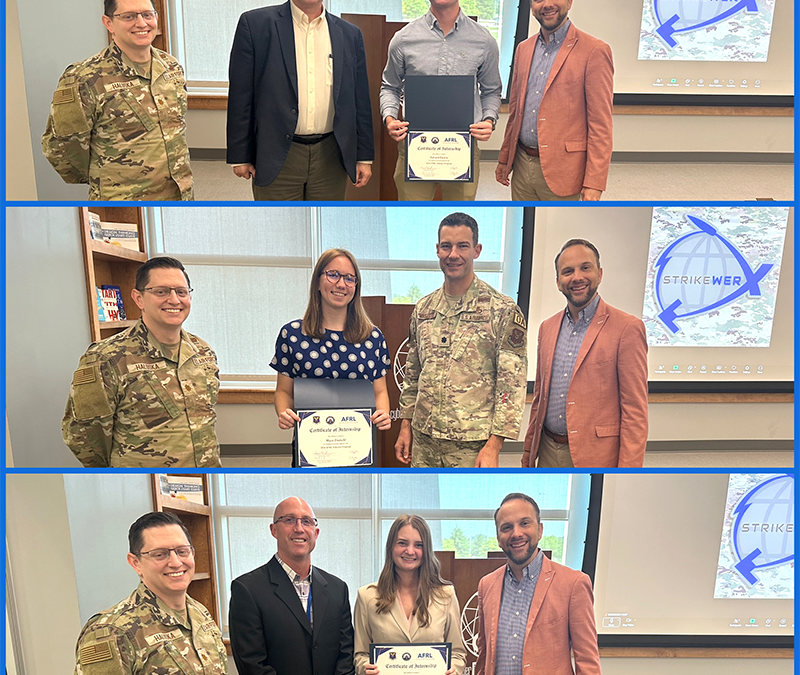Maj. Nathan Haluska from AFGSC Office of the Chief Scientist, far left, and CIC President Kevin Nolten, far right, celebrated the AFRL Scholars completing their summer session at Barksdale AFB, Louisiana. Pictured top to bottom: AFRL Scholar Ed Easton with his mentor Don Copsey, AFRL Scholar Maya Trutschl with her mentor Lt. Col. Richard Mickelsen, and AFRL Scholar Candice Brown with her mentor Dr. Tucker Reddy. (Robin Nichols/STRIKEWERX)
By Sean Green | STRIKEWERX Communications Manager
BOSSIER CITY, La. — Students from across the country spent the summer aiding Air Force Global Strike Command (AFGSC) projects via the Air Force Research Laboratory (AFRL) Scholars Program.
Administered via the partnership between the Cyber Innovation Center (CIC) and AFGSC, the AFRL Scholars Program is a summer internship for students pursuing science, technology, engineering and mathematics degrees. Selected interns gain hands-on experience working with professional scientists and engineers on projects selected by the AFGSC Office of the Chief Scientist during a 10- to 12-week summer program at Barksdale Air Force Base, Louisiana.
“This program exposes students to emerging technologies and Air Force careers while the Air Force benefits from utilizing students’ existing knowledge on research-based projects,” said Kevin Nolten, CIC President. “The CIC is proud to support this program so our partners in the command can find new perspectives and make progress on complex challenges.”
Dr. Tucker Reddy, AFRL Scholars mentor for AFGSC’s Air, Space and Information Operations Directorate, said his highlight was working with young, energetic people who have a different perspective.
“The program helps us take a step outside the narrow box we think in to explain concepts at a fundamental level, and we get to experience the first-time joy of someone who is young and enthusiastic about the project,” said Dr. Reddy. “They asked questions we hadn’t thought to ask and found new correlations to explore. Their enthusiasm can push projects in new directions.” Noting the Readiness for Aircrew Flying Training project for example, which collects a tremendous amount of data, had laid dormant until the AFRL scholars assisted.
“[They] allowed us to take those results and immediately implement them. We have already shared research results and ways to improve with B-52 aircrews,” said. Dr. Reddy.
Speaking of her time working Dr. Reddy, Candice Brown, a doctoral student at West Virginia University, said the AFRL Scholars program has been the most meaningful experience in her career. “This project pushed me out of my comfort zone and that was invaluable because it opened up my career opportunities,” she said. “… if I can use my skills to support our Air Force, then I feel honored and grateful.”
Maya Trutschl, a junior at Caddo Magnet High School in Shreveport, Louisiana, used her skills in data analysis to aid in decision making on weather-related risk to AFGSC buildings. “It’s a big problem and needed more attention. Infrastructure is important for national security and hopefully my research helped that.”
“I felt unsure coming into [it], but speaking with experts broadened my mindset,” said Ed Easton, a student at the University of Minnesota. “I’m more confident now and it’s a good feeling to be part of Global Strike’s mission and to contribute to it where I can.”
About the Cyber Innovation Center
Cyber Innovation Center (CIC), located in Bossier City, Louisiana, is the anchor of the 3,000-acre National Cyber Research Park and serves as the catalyst for the development and expansion of a knowledge-based workforce throughout the region. As a 501c3 not-for-profit corporation, CIC fosters collaboration among its partners and accelerates technology, research, and development. One of its primary missions is to develop a sustainable knowledge-based workforce that can support the growing needs of government, industry, and academic partners.


